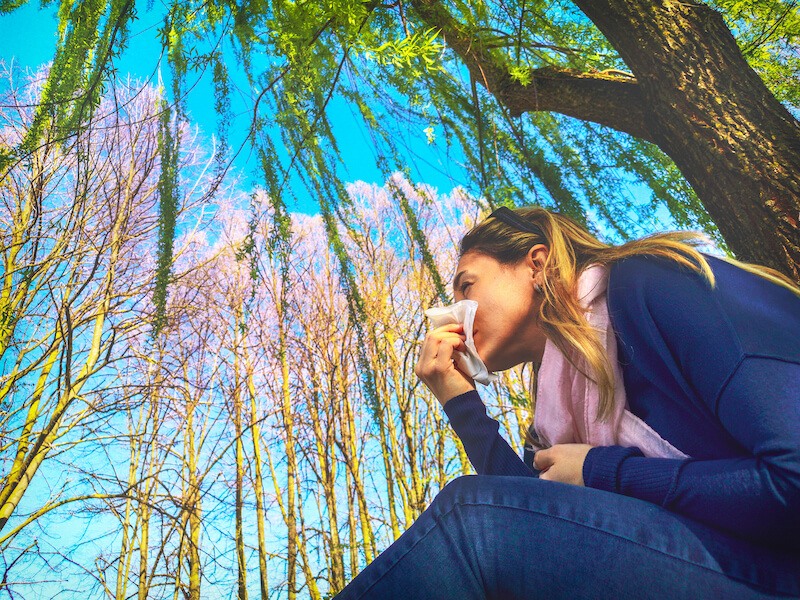
Ah, Spring! Winter was so long but you’re finally able to open up those windows and….begin sneezing. Okay, that sneezing part isn’t so enjoyable. But the fact is, it’s allergy season.
Every year, allergy season generally goes from March to October. So, are you going to be managing nine months of itchy eyes and runny nose? You don’t necessarily have to. And there are a couple of reasons why you might have some relief to look forward to.
What are seasonal allergies?
When we think about “allergy season,” it’s usually in reference to, well, seasonal allergies. To better explain what seasonal allergies are, let’s back up just a little and briefly discuss what causes allergies in general. When a harmless substance is mistaken by your body for a hazardous one, your body activates your immune system to protect you.
This leads to a number of symptoms, though the most prevalent are those “cold-like” symptoms we often link to seasonal allergies: coughing, sneezing, runny nose, itchy eyes, and so on. Depending on the allergen, people could also notice swelling, problems breathing, or more serious symptoms.
Now, the human body can be allergic to nearly anything. But being allergic to outdoor particles, like pollen and spores is really prevalent. Because those pollens (or spores or other particles) tend to appear seasonally (every spring, for instance), you wind up with allergy symptoms that also develop seasonally: hence, seasonal allergies.
Planning the 2022 allergy season
So what can you anticipate for the 2022 allergy season? The easiest way to create reasonable expectations might be to examine the year on a monthly basis.
Allergies in April
If you find yourself sneezing and coughing in April, the responsible party may actually be the trees outside your house. This might come as a surprise to some because most people don’t think of trees as especially offensive. But do produce pollen.
If the first few weeks of spring are particularly difficult, you may be allergic to maple or ash trees which start to pollinate in April. Usually, the best way to manage your symptoms during this time is to track the daily pollen count (normally you can find this on any weather app or the local news) and stay inside when the count gets too high.
May and June allergies
The next group of allergenic plants usually start flowering in May and June. Mostly, these pollens are made by flowers and grasses. These pollens are widespread and potent, mostly because of the quantity of rain that falls in April, May and June. Meaning that if you’re allergic to these green grasses and flowering plants, May and June will likely produce prolonged symptoms.
In most cases, these pollens reach their peak near the early afternoon, so if you’re symptomatic and have to go outside to do some yard work, plan to do so in the morning.
In July, you might get a break
It’s dryer in July on average. This means you might actually get a rest from allergy symptoms. This will, naturally, depend on local weather patterns during any given year. So if you have to organize that outdoor family gathering, July might be the best time to do it!
Allergies in August through October
Don’t get accustomed to the allergy threshold in July though. Because ragweed peaks in August. The allergy symptoms from ragweed, also referred to as “hay fever” are extremely common.
And what’s worse, ragweed hangs around a while. You may be dealing with this specific allergen all the way into October. Naturally, ragweed isn’t the only allergen that sticks around until the ground freezes. Mold allergens can also be really pervasive at this time of year, too.
How to tackle seasonal allergies
It can be challenging to manage seasonal allergies. You can attempt to use the timing of your symptoms to determine which particular pollens are making you sneeze and cough. But to really understand what the cause is you should contact us for an appointment.
Still, you can figure out how to structure your year by knowing what time of the year specific allergies peak. This will be as dependable for future allergy seasons as it is for the 2022 season. You can expect a little bit of variation from year to year (in general, allergy seasons seem like they’re getting longer and more extreme all the time), but keep track of your local and regional weather conditions, also.
You can still enjoy being outdoors even if you have seasonal allergies. But an antihistamine and a little planning will go a long way.
References
https://www.mayoclinic.org/diseases-conditions/allergies/symptoms-causes/syc-20351497#:~:text=Common%20allergy%20triggers%20include%3A,from%20a%20bee%20or%20wasp